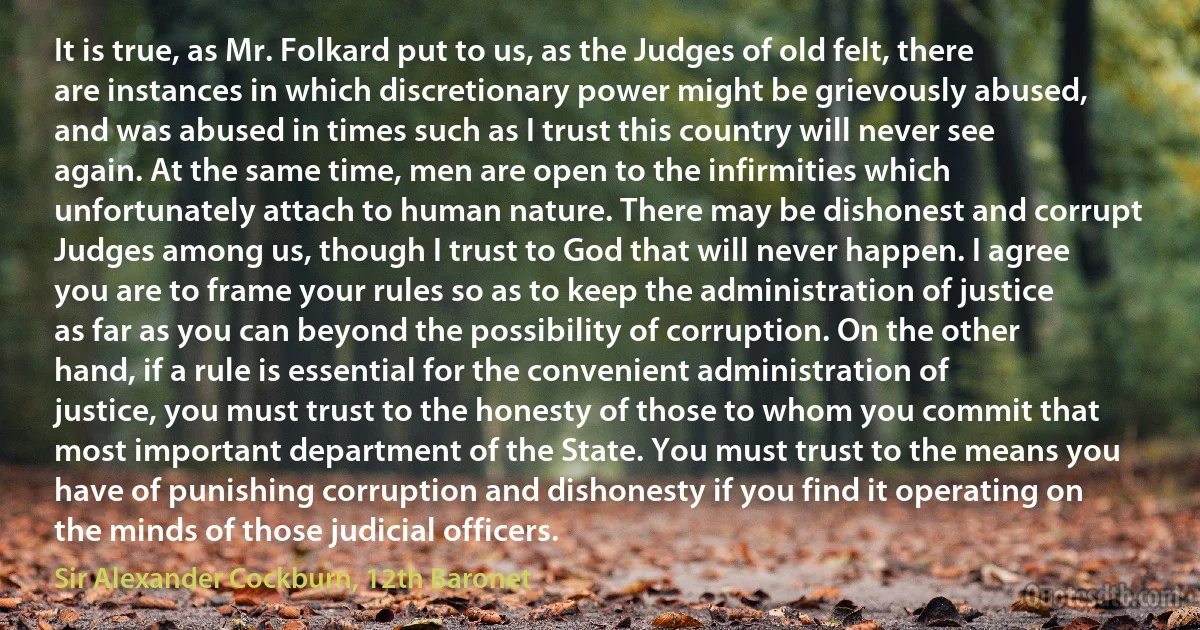
It is true, as Mr. Folkard put to us, as the Judges of old felt, there are instances in which discretionary power might be grievously abused, and was abused in times such as I trust this country will never see again. At the same time, men are open to the infirmities which unfortunately attach to human nature. There may be dishonest and corrupt Judges among us, though I trust to God that will never happen. I agree you are to frame your rules so as to keep the administration of justice as far as you can beyond the possibility of corruption. On the other hand, if a rule is essential for the convenient administration of justice, you must trust to the honesty of those to whom you commit that most important department of the State. You must trust to the means you have of punishing corruption and dishonesty if you find it operating on the minds of those judicial officers.
Sir Alexander Cockburn, 12th BaronetRelated topics
administration beyond commit country department far felt find frame hand honesty human judicial justice men might nature open possibility power punishing rule see state times time trust means judges rulesRelated quotes
He loved his profession, he had a real sense of dedication to the administration of justice, he held his head high as a lawyer, he rendered and exacted courtesy, honor and straightforwardness at the Bar. He respected the judicial office deeply, demanded the highest standards of competence and disinterestedness and dignity, despised all political use of or trifling with judicial power, and had an affectionate regard for every man who filled the exacting prescription of the just judge. The law to him was like a religion, and its practice was more than a means of support; it was a mission. He was not always popular in his community, but he was respected. Unpopular minorities and individuals often found in him their only mediator and advocate. He was too independent to court the populace - he thought of himself as a leader and lawgiver, not a mouthpiece.

Robert H. Jackson
Scotland and Ireland were virtually disfranchised; Edinburgh and Glasgow, the two largest cities of Scotland, had each a constituency of only thirty-three members. A majority of the members of the House of Commons were elected by six thousand voters. This state of affairs afforded ready opportunities for the moneyed aristocracy to buy seats in Parliament, by the purchase of a few voters in rotten boroughs ; and also enabled the ministry to secure a servile majority in the Commons. The corruption resulting from these conditions, as exhibited in the latter half of the eighteenth century, can hardly be realized by the present generation. They afford, however, an illustration of the universal truth, that a government which does not draw its inspiration of liberty, justice, and morality from the people will soon become both tyrannical and corrupt.

James A. Garfield
The aims and ideals of the Soviet revolution inspired the patriotic enthusiasm of millions of people in the 1930s, during World War II, and in the postwar reconstruction period. This explains the Soviet Union's great leap forward, the achievement of a high level of industrial capacity in a very short time, the transformation of the Soviet Union into a major power in terms of science and culture. The historic victory in the Great Patriotic War against Nazism, which was a surprise not only for Hitler but also for the Western democracies is also explained by what we have said above. All this is true. But the historical truth is also that the regime and the system abused the faith of the people in these high ideals, turning them to its own advantage. Rule by the people, equality, justice, and the promise of a happy future - all these ideas were utilized for the sake of maintaining and strengthening totalitarianism.

Mikhail Gorbachev
We find, in the rules laid down by the greatest English Judges, who have been the brightest of mankind; We are to look upon it as more beneficial, that many guilty persons should escape unpunished, than one innocent person should suffer. The reason is, because it's of more importance to community, that innocence should be protected, than it is, that guilt should be punished; for guilt and crimes are so frequent in the world, that all of them cannot be punished; and many times they happen in such a manner, that it is not of much consequence to the public, whether they are punished or not. But when innocence itself, is brought to the bar and condemned, especially to die, the subject will exclaim, it is immaterial to me, whether I behave well or ill; for virtue itself, is no security. And if such a sentiment as this, should take place in the mind of the subject, there would be an end to all security what so ever.

John Adams
Decency, security, and liberty alike demand that government officials shall be subjected to the same rules of conduct that are commands to the citizen. In a government of laws, existence of the government will be imperiled if it fails to observe the law scrupulously. Our government is the potent, the omnipresent teacher. For good or for ill, it teaches the whole people by its example. Crime is contagious. If the government becomes a lawbreaker, it breeds contempt for law; it invites every man to become a law unto himself; it invites anarchy. To declare that in the administration of the criminal law the end justifies the means -- to declare that the government may commit crimes in order to secure the conviction of a private criminal -- would bring terrible retribution. Against that pernicious doctrine this court should resolutely set its face.

Louis Brandeis
